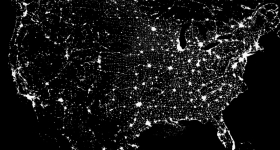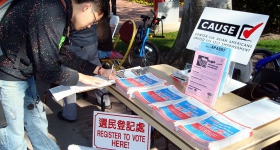Perhaps more puzzling
than Balsam's initial reaction to the seemingly benign message is the
clear subtext of Wang's account: the shared perception of unfairness
underlying the students' certainty that the English version of such a
message would generate a lot more (unjustifiable) outrage. The
implication, of course, is that ethnic minorities enjoy a certain
amount of joke-privilege that not only excludes white people, but is
often exercised at their expense. After all, if Miley Cyrus is shunned for referencing a particular race while innocently "goofing around," why should anyone be able to reference any race in any way ever?
While
I often have the pleasure of hearing white folks around me decry
"reverse racism" when confronted with their own prejudices, this case
is particularly close to heart because it so clearly illustrates a
major flaw of the "reverse racism" myth: That it fails to take into
account the inherently asymmetrical connotations of different
prejudicial acts.
The students were concerned that a message written in Chinese which said "White
people can't see this / White people can't read this / White
people can't understand this" would not be taken as seriously as a
similar message written in English. To be clear, a similar message in
English would be "Chinese people can't see this / Chinese people can't
read this / Chinese people can't understand this." Obviously these two
"similar" statements, similarly written on a chalkboard at Princeton,
have disparate implications.
The
first -- written in Chinese in a place where Chinese is not widely
visibly recognized, read, or understood by whites -- could very well be
a statement of fact. Would I expect cleverer graffiti from Princeton
students? Yes. Does that mean it's racist? No. On the other hand, the
second message -- written in English in a place where English is widely visibly recognized, read, and understood by Chinese -- implies that Chinese students at Princeton don't know English. See the difference, there?
Now,
I know the second message is only hypothetical but -- well, actually,
wait a second... doesn't it kind of remind you of that time when the
Princetonian published a joke article lampooning a particular Asian American student who had been denied admission? It went something like this:
“Hi Princeton! Remember me? I so good at math and science. Perfect 2400
SAT score. Ring Bells? Just in case, let me
refresh your memories. I the super smart Asian. Princeton the super
dumb college, not accept me.”
That's almost... straightforwardly racist. Nevertheless, the Princetonian's Managing Board justified the article, saying:
“Using hyperbole and an unbelievable string of stereotypes, we hoped to
lampoon racism by showing it at its most outrageous... We embraced racist language in order to strangle it."
Kind
of makes the whole Bloomberg Hall chalkboard incident seem rather
trivial, doesn't it? Perhaps those leading the investigation which it
sparked will come to think so too.
On a side note: They
"embraced racist language in order to strangle it?" Really? Don't these
kids go to Princeton, for crying out loud??










Comments